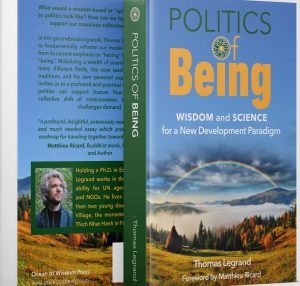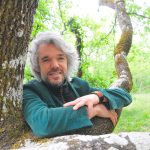Politics of Being
The featured image is a symbolic representation of the phylogenetic tree, a diagram that depicts the lines of evolutionary descent of different species, organisms, or genes. Here, it represents that a Politics of Being is in support of evolution and all beings.
A few days ago, my wife, Emelina, sent me this quote from Toni Morrison:
“If there’s a book you really want to read, but it hasn’t been written yet, then you must write it.”
It took me ten years to write Politics of Being before it was released on January 22nd, 2022, the day my teacher, Zen master Thich Nhat Hanh, turned into a cloud. Ten years of reading and taking notes, of slowly distilling many different ideas, while also experiencing doubts, frustration and sleepless nights.
I was looking to answer a simple, yet essential, question – the question of our time I believe:
How can we organize societies to promote the collective flourishing of the whole Earth community and bring about the cultural, spiritual evolution so needed today?

It was an answer that necessarily had to be built on existing works. I was looking in particular for the perspectives of religious and wisdom traditions and found this sentence from the Earth Charter in the interreligious statement at the Rio+20 Conference: “human development is primarily about being more, rather than having more.”
In ‘being’, I knew I had found the basis for the new development paradigm we need. It was clear to me, from my work as an environmentalist, that little can be achieved within our current system which prioritizes economic growth over everything else. We need to redefine our priorities, the purpose of our lives, not only as individuals but also as societies.
The politics of being recognizes that life is a spiritual journey and aims at aligning our institutions with our true reason for being here on Earth: becoming who we are, the best and most complete version of ourselves.
To my great surprise, I found out that this “being” agenda, which seemed to be the compass for finding our way out of many of the converging crises we face, had not yet been defined, in theory or in practice. “I don’t understand why no one has written this book yet”, I kept repeating to my wife, each time I attained a new insight that made this proposal appear more essential and obvious.
So, I patiently gathered the seeds of this new politics to develop an integrative framework informed by many new fields of research and built around spiritual values such as happiness, love, peace, mindfulness, freedom, abundance, life and systemic thinking. These form the foundation of the politics of being.
 The book proposes actionable policy agendas in many sectors, based almost exclusively on existing examples, to show that this vision is concrete, grounded, and absolutely feasible. There is no doubt that if societies would start organizing themselves according to these principles, they would make a giant leap into adulthood and score high in many social progress indexes.
The book proposes actionable policy agendas in many sectors, based almost exclusively on existing examples, to show that this vision is concrete, grounded, and absolutely feasible. There is no doubt that if societies would start organizing themselves according to these principles, they would make a giant leap into adulthood and score high in many social progress indexes.
A good friend of mine, stated it clearly:
“While material endeavors can grow huge quickly but don’t last, spiritual enterprises start small but grow steadily.”
Maybe this lends us no other choice than enjoying together this eternal journey of (inter-)being?
Like all the contributors featured in this special issue of Kosmos who touch upon many different dimensions of this new paradigm – from leadership and collective healing to governance, urban planning and the role of arts in this transition – I feel blessed and fulfilled to have found in this spiritual enterprise a ‘path with heart’ for channeling all my love and hope – for the benefit of all. I believe that one day our societies will be organized in such a way that each of us can find such a path.
Now is the time to begin.
Kosmos Guest Editor, Thomas Legrand


